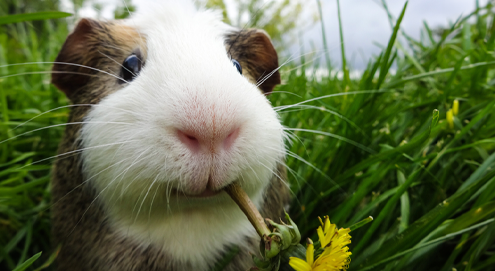Vegetables and Fruit: What’s Allowed and What’s Not
Guinea pigs need a daily portion of fresh vegetables in addition to their main meal of hay. Suitable vegetables include bell pepper, cucumber, chicory, and escarole. These contain important vitamins and minerals that contribute to their overall health. It’s important to introduce new vegetables gradually, so their digestive system can adjust and potential reactions like diarrhea can be avoided. Start offering a variety of vegetables from a young age so they get used to a diverse diet. This not only helps them stay healthy but also makes them less picky. Fruit such as apple, strawberry, and pear can be given as a treat, but in moderation due to their high sugar content.
There are also foods that guinea pigs should never eat, as they are toxic or harmful. Examples include onion, leek, potatoes, avocado, zucchini, corn, and rhubarb. Products like chocolate, bread, and dairy are also unsuitable because a guinea pig’s digestive system cannot process them. Avoid giving them food that has been sprayed or contaminated, such as grass from areas treated with pesticides.
You can find a full list of suitable and unsafe foods in the dropdown section at the bottom of this page.
What Kind of Pellets Should You Feed Your Guinea Pigs?
Pellets are an important part of a guinea pig’s diet because they often contain added nutrients like vitamin C. There are different types of pellets available, such as compressed pellets or muesli-style mixes. It’s best to choose compressed pellets, as these prevent selective eating and ensure your guinea pig consumes all the nutrients it needs. Examples include Supreme Science Selective Guinea Pig and Bunny Nature Guinea Pig Dream Basic. These pellets all look the same and don’t contain colorful pieces.
The amount of pellets to give depends on the brand and nutritional content, but typically 20 to 30 grams per guinea pig per day is sufficient. It’s important not to exceed the recommended amount, as too many pellets can lead to obesity and decreased interest in hay and vegetables, which are vital for their health. Always make sure your guinea pigs have finished their portion before offering more.
The Role of Vitamin C in a Guinea Pig’s Diet
Guinea pigs cannot produce their own vitamin C, so it’s important to add it to their diet daily. A vitamin C deficiency can lead to health issues such as joint problems, dental issues, and a weakened immune system. Fresh vegetables like bell pepper, kale, and parsley are excellent sources of vitamin C. Additionally, supplements can be given to ensure they’re getting enough. Any excess vitamin C is excreted in the urine, so it’s completely safe.
Most guinea pig pellets contain added vitamin C. However, it’s important to know that vitamin C is sensitive to light, moisture, and heat, which can cause the levels in the food to decrease quickly. Always choose pellets in light-proof packaging and avoid bulk bins. You can also provide extra vitamin C in the form of drops or tablets. Adding a liquid supplement to drinking water is another option, but keep in mind that vitamin C in water can degrade quickly sometimes within just a few hours. That’s why it’s essential to refresh their water regularly.
Additions to Your Guinea Pig’s Diet
Dried herbs are a tasty and nutritious addition to your guinea pig’s diet. They contain important nutrients like vitamins and minerals and add extra variety to their meals. Safe and popular choices include parsley, plantain, dandelion leaves, chamomile, and nettle most guinea pigs love them.
Always introduce new herbs gradually to prevent digestive issues and make sure your guinea pigs tolerate them well. Sprinkle a small amount of dried herbs over their hay or in their food bowl as a healthy and tasty treat. A daily portion of 5 to 10 grams per guinea pig is sufficient, depending on their size.
If you want to offer your guinea pigs a snack from time to time, always opt for a healthy option. Products like Supreme Forest Sticks are specially formulated for guinea pigs and contain natural ingredients that meet their nutritional needs. Treats should be given in moderation so that hay, vegetables, and pellets remain their main source of nutrition.
The Importance of a Varied and Safe Diet
By offering guinea pigs a varied diet, you help keep them healthy and ensure they get all the essential nutrients they need. A well-balanced diet supports a happy and energetic guinea pig and promotes a healthy digestive system.




